- Home
- Henry James
The Outcry: -1911 Page 2
The Outcry: -1911 Read online
Page 2
Lady Sandgate, in her demonstrative way, appealed to the general rich scene. "Then why does he say it's me he's pursuing?"
He seemed to recognise promptly enough in her the sense of a menaced monopoly. "My dear lady, he's pursuing expensive works of art."
"By which you imply that I'm one?" She might have been wound up by her disappointment to almost any irony.
"I imply—or rather I affirm—that every handsome woman is! But what he arranged with me about," Lord John explained, "was that he should see the Dedborough pictures in general and the great Sir Joshua in particular—of which he had heard so much and to which I've been thus glad to assist him."
This news, however, with its lively interest, but deepened the listener's mystification. "Then why—this whole week that I've been in the house—hasn't our good friend here mentioned to me his coming?"
"Because our good friend here has had no reason"—Lord John could treat it now as simple enough. "Good as he is in all ways, he's so best of all about showing the house and its contents that I haven't even thought necessary to write him that I'm introducing Breckenridge."
"I should have been happy to introduce him," Lady Sandgate just quavered—"if I had at all known he wanted it."
Her companion weighed the difference between them and appeared to pronounce it a trifle he didn't care a fig for. "I surrender you that privilege then—of presenting him to his host—if I've seemed to you to snatch it from you." To which Lord John added, as with liberality unrestricted, "But I've been taking him about to see what's worth while—as only last week to Lady Lappington's Longhi."
This revelation, though so casual in its form, fairly drew from Lady Sandgate, as she took it in, an interrogative wail. "Her Longhi?"
"Why, don't you know her great Venetian family group, the What-do-you-call-'ems?—seven full-length figures, each one a gem, for which he paid her her price before he left the house."
She could but make it more richly resound—almost stricken, lost in her wistful thought: "Seven full-length figures? Her price?"
"Eight thousand—slap down. Bender knows," said Lord John, "what he wants."
"And does he want only"—her wonder grew and grew—
"What-do-you-call-'ems'?"
"He most usually wants what he can't have." Lord John made scarce more of it than that. "But, awfully hard up as I fancy her, Lady Lappington went at him."
It determined in his friend a boldly critical attitude. "How horrible—at the rate things are leaving us!" But this was far from the end of her interest. "And is that the way he pays?"
"Before he leaves the house?" Lord John lived it amusedly over. "Well, she took care of that."
"How incredibly vulgar!" It all had, however, for Lady Sandgate, still other connections—which might have attenuated Lady Lappington's case, though she didn't glance at this. "He makes the most scandalous eyes—the ruffian!—at my great-grandmother." And then as richly to enlighten any blankness: "My tremendous Lawrence, don't you know?—in her wedding-dress, down to her knees; with such extraordinarily speaking eyes, such lovely arms and hands, such wonderful flesh-tints: universally considered the masterpiece of the artist."
Lord John seemed to look a moment not so much at the image evoked, in which he wasn't interested, as at certain possibilities lurking behind it. "And are you going to sell the masterpiece of the artist?"
She held her head high. "I've indignantly refused—for all his pressing me so hard."
"Yet that's what he nevertheless pursues you to-day to keep up?"
The question had a little the ring of those of which the occupant of a witness-box is mostly the subject, but Lady Sandgate was so far as this went an imperturbable witness. "I need hardly fear it perhaps if—in the light of what you tell me of your arrangement with him—his pursuit becomes, where I am concerned, a figure of speech."
"Oh," Lord John returned, "he kills two birds with one stone—he sees both Sir Joshua and you."
This version of the case had its effect, for the moment, on his fair associate. "Does he want to buy their pride and glory?"
The young man, however, struck on his own side, became at first but the bright reflector of her thought. "Is that wonder for sale?"
She closed her eyes as with the shudder of hearing such words. "Not, surely, by any monstrous chance! Fancy dear, proud Theign———!"
"I can't fancy him—no!" And Lord John appeared to renounce the effort. "But a cat may look at a king and a sharp funny Yankee at anything."
These things might be, Lady Sandgate's face and gesture apparently signified; but another question diverted her. "You're clearly a wonderful showman, but do you mind my asking you whether you're on such an occasion a—well, a closely interested one?"
"'Interested'?" he echoed; though it wasn't to gain time, he showed, for he would in that case have taken more. "To the extent, you mean, of my little percentage?" And then as in silence she but kept a slightly grim smile on him: "Why do you ask if—with your high delicacy about your great-grandmother—you've nothing to place?"
It took her a minute to say, while her fine eye only rolled; but when she spoke that organ boldly rested and the truth vividly appeared. "I ask because people like you, Lord John, strike me as dangerous to the—how shall I name it?—the common weal; and because of my general strong feeling that we don't want any more of our national treasures (for I regard my great-grandmother as national) to be scattered about the world."
"There's much in this country and age," he replied in an off-hand manner, "to be said about that," The present, however, was not the time to say it all; so he said something else instead, accompanying it with a smile that signified sufficiency. "To my friends, I need scarcely remark to you, I'm all the friend."
She had meanwhile seen the butler reappear by the door that opened to the terrace, and though the high, bleak, impersonal approach of this functionary was ever, and more and more at every step, a process to defy interpretation, long practice evidently now enabled her to suggest, as she turned again to her fellow-visitor a reading of it. "It's the friend then clearly who's wanted in the park."
She might, by the way Banks looked at her, have snatched from his hand a missive addressed to another; though while he addressed himself to her companion he allowed for her indecorum sufficiently to take it up where she had left it. "By her ladyship, my lord, who sends to hope you'll join them below the terrace."
"Ah, Grace hopes," said Lady Sandgate for the young man's encouragement. "There you are!"
Lord John took up the motor-cap he had lain down on coming in. "I rush to Lady Grace, but don't demoralise Bender!" And he went forth to the terrace and the gardens.
Banks looked about as for some further exercise of his high function. "Will you have tea, my lady?"
This appeared to strike her as premature. "Oh, thanks—when they all come in."
"They'll scarcely all, my lady"—he indicated respectfully that he knew what he was talking about. "There's tea in her ladyship's tent; but," he qualified, "it has also been ordered for the saloon."
"Ah then," she said cheerfully, "Mr. Bender will be glad—!" And she became, with this, aware of the approach of another visitor. Banks considered, up and down, the gentleman ushered in, at the left, by the footman who had received him at the main entrance to the house. "Here he must be, my lady." With which he retired to the spacious opposite quarter, where he vanished, while the footman, his own office performed, retreated as he had come, and Lady Sandgate, all hospitality, received the many-sided author of her specious telegram, of Lord John's irritating confidence and of Lady Lappington's massive cheque.
II
Having greeted him with an explicitly gracious welcome and both hands out, she had at once gone on: "You'll of course have tea?—in the saloon."
But his mechanism seemed of the type that has to expand and revolve before sounding. "Why; the very first thing?"
She only desired, as her laugh showed, to accommodate. "Ah, have it t
he last if you like!"
"You see your English teas—!" he pleaded as he looked about him, so immediately and frankly interested in the place and its contents that his friend could only have taken this for the very glance with which he must have swept Lady Lappington's inferior scene.
"They're too much for you?"
"Well, they're too many. I think I've had two or three on the road—at any rate my man did. I like to do business before—" But his sequence dropped as his eye caught some object across the wealth of space.
She divertedly picked it up. "Before tea, Mr. Bender?"
"Before everything, Lady Sandgate." He was immensely genial, but a queer, quaint, rough-edged distinctness somehow kept it safe—for himself.
"Then you've come to do business?" Her appeal and her emphasis melted as into a caress—which, however, spent itself on his large high person as he consented, with less of demonstration but more of attention, to look down upon her. She could therefore but reinforce it by an intenser note. "To tell me you will treat?"
Mr. Bender had six feet of stature and an air as of having received benefits at the hands of fortune. Substantial, powerful, easy, he shone as with a glorious cleanness, a supplied and equipped and appointed sanity and security; aids to action that might have figured a pair of very ample wings—wide pinions for the present conveniently folded, but that he would certainly on occasion agitate for great efforts and spread for great flights. These things would have made him quite an admirable, even a worshipful, image of full-blown life and character, had not the affirmation and the emphasis halted in one important particular. Fortune, felicity, nature, the perverse or interfering old fairy at his cradle-side—whatever the ministering power might have been—had simply overlooked and neglected his vast wholly-shaven face, which thus showed not so much for perfunctorily scamped as for not treated, as for neither formed nor fondled nor finished, at all. Nothing seemed to have been done for it but what the razor and the sponge, the tooth-brush and the looking-glass could officiously do; it had in short resisted any possibly finer attrition at the hands of fifty years of offered experience. It had developed on the lines, if lines they could be called, of the mere scoured and polished and initialled "mug" rather than to any effect of a composed physiognomy; though we must at the same time add that its wearer carried this featureless disk as with the warranted confidence that might have attended a warning headlight or a glaring motor-lamp. The object, however one named it, showed you at least where he was, and most often that he was straight upon you. It was fearlessly and resistingly across the path of his advance that Lady Sandgate had thrown herself, and indeed with such success that he soon connected her demonstration with a particular motive. "For your grandmother, Lady Sandgate?" he then returned.
"For my grandmother's mother, Mr. Bender—the most beautiful woman of her time and the greatest of all Lawrences, no matter whose; as you quite acknowledged, you know, in our talk in Bruton Street."
Mr. Bender bethought himself further—yet drawing it out; as if the familiar fact of his being "made up to" had never had such special softness and warmth of pressure. "Do you want very, very much——?"
She had already caught him up. "'Very, very much' for her? Well, Mr. Bender," she smilingly replied, "I think I should like her full value."
"I mean"—he kindly discriminated—"do you want so badly to work her off?"
"It would be an intense convenience to me—so much so that your telegram made me at once fondly hope you'd be arriving to conclude."
Such measure of response as he had good-naturedly given her was the mere frayed edge of a mastering detachment, the copious, impatient range elsewhere of his true attention. Somehow, however, he still seemed kind even while, turning his back upon her, he moved off to look at one of the several, the famous Dedborough pictures—stray specimens, by every presumption, lost a little in the whole bright bigness. "'Conclude'?" he echoed as he approached a significantly small canvas. "You ladies want to get there before the road's so much as laid or the country's safe! Do you know what this here is?" he at once went on.
"Oh, you can't have that!" she cried as with full authority—"and you must really understand that you can't have everything. You mustn't expect to ravage Dedborough."
He had his nose meanwhile close to the picture. "I guess it's a bogus Cuyp—but I know Lord Theign has things. He won't do business?"
"He's not in the least, and can never be, in my tight place," Lady Sandgate replied; "but he's as proud as he's kind, dear man, and as solid as he's proud; so that if you came down under a different impression—!" Well, she could only exhale the folly of his error with an unction that represented, whatever he might think of it, all her competence to answer for their host.
He scarce thought of it enough, on any side, however, to be diverted from prior dispositions. "I came on an understanding that I should find my friend Lord John, and that Lord Theign would, on his introduction, kindly let me look round. But being before lunch in Bruton Street I knocked at your door——"
"For another look," she quickly interposed, "at my Lawrence?"
"For another look at you, Lady Sandgate—your great-grandmother wasn't required. Informed you were here, and struck with the coincidence of my being myself presently due," he went on, "I despatched you my wire, on coming away, just to keep up your spirits."
"You don't keep them up, you depress them to anguish," she almost passionately protested, "when you don't tell me you'll treat!"
He paused in his preoccupation, his perambulation, conscious evidently of no reluctance that was worth a scene with so charming and so hungry a woman. "Well, if it's a question of your otherwise suffering torments, may I have another interview with the old lady?"
"Dear Mr. Bender, she's in the flower of her youth; she only yearns for interviews, and you may have," Lady Sandgate earnestly declared, "as many as you like."
"Oh, you must be there to protect me!"
"Then as soon as I return——!"
"Well,"—it clearly cost him little to say—"I'll come right round."
She joyously registered the vow. "Only meanwhile then, please, never a word!"
"Never a word, certainly. But where all this time," Mr. Bender asked, "is Lord John?"
Lady Sandgate, as he spoke, found her eyes meeting those of a young woman who, presenting herself from without, stood framed in the doorway to the terrace; a slight fair grave young woman, of middle, stature and simply dressed, whose brow showed clear even under the heavy shade of a large hat surmounted with big black bows and feathers. Her eyes had vaguely questioned those of her elder, who at once replied to the gentleman forming the subject of their inquiry: "Lady Grace must know." At this the young woman came forward, and Lady Sandgate introduced the visitor. "My dear Grace, this is Mr. Breckenridge Bender."
The younger daughter of the house might have arrived in preoccupation, but she had urbanity to spare. "Of whom Lord John has told me," she returned, "and whom I'm glad to see. Lord John," she explained to his waiting friend, "is detained a moment in the park, open to-day to a big Temperance school-feast, where our party is mostly gathered; so that if you care to go out—!" She gave him in fine his choice.
But this was clearly a thing that, in the conditions, Mr. Bender wasn't the man to take precipitately; though his big useful smile disguised his prudence. "Are there any pictures in the park?"
Lady Grace's facial response represented less humour perhaps, but more play. "We find our park itself rather a picture."
Mr. Bender's own levity at any rate persisted. "With a big Temperance school-feast?"
"Mr. Bender's a great judge of pictures," Lady Sandgate said as to forestall any impression of excessive freedom.
"Will there be more tea?" he pursued, almost presuming on this.
It showed Lady Grace for comparatively candid and literal. "Oh, there'll be plenty of tea."
This appeared to determine Mr. Bender. "Well, Lady Grace, I'm after pictures, but I take them 'neat.'
May I go right round here?"
"Perhaps, love," Lady Sandgate at once said, "you'll let me show him."
"A moment, dear"—Lady Grace gently demurred. "Do go round," she conformably added to Mr. Bender; "take your ease and your time. Everything's open and visible, and, with our whole company dispersed, you'll have the place to yourself."
He rose, in his genial mass, to the opportunity. "I'll be in clover—sure!" But present to him was the richest corner of the pasture, which he could fluently enough name. "And I'll find 'The Beautiful Duchess of Waterbridge'?"
She indicated, off to the right, where a stately perspective opened, the quarter of the saloon to which we have seen Mr. Banks retire. "At the very end of those rooms."
He had wide eyes for the vista. "About thirty in a row, hey?" And he was already off. "I'll work right through!"
III
Left with her friend, Lady Grace had a prompt question. "Lord John warned me he was 'funny'—but you already know him?"
There might have been a sense of embarrassment in the way in which, as to gain time, Lady Sandgate pointed, instead of answering, to the small picture pronounced upon by Mr. Bender. "He thinks your little Cuyp a fraud."
"That one?" Lady Grace could but stare. "The wretch!" However, she made, without alarm, no more of it; she returned to her previous question. "You've met him before?"
"Just a little—in town. Being 'after pictures'" Lady Sandgate explained, "he has been after my great-grandmother."
"She," said Lady Grace with amusement, "must have found him funny! But he can clearly take care of himself, while Kitty takes care of Lord John, and while you, if you'll be so good, go back to support father—in the hour of his triumph: which he wants you so much to witness that he complains of your desertion and goes so far as to speak of you as sneaking away."

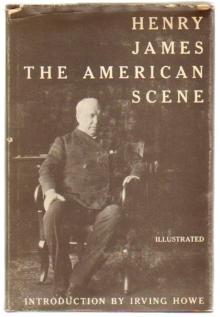 The American
The American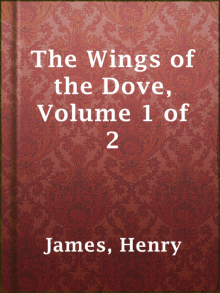 The Wings of the Dove, Volume 1 of 2
The Wings of the Dove, Volume 1 of 2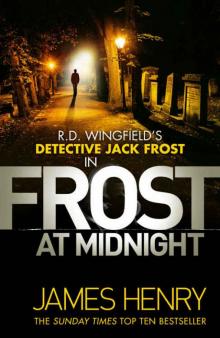 Frost at Midnight
Frost at Midnight Morning Frost
Morning Frost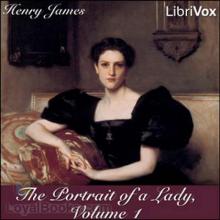 The Portrait of a Lady — Volume 1
The Portrait of a Lady — Volume 1 Fatal Frost
Fatal Frost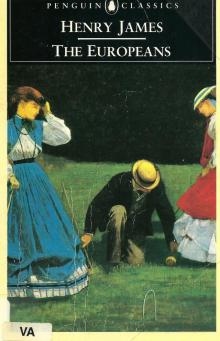 The Europeans
The Europeans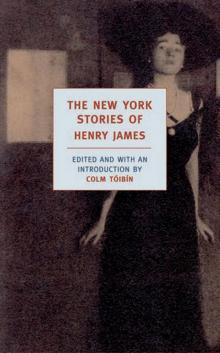 The New York Stories of Henry James
The New York Stories of Henry James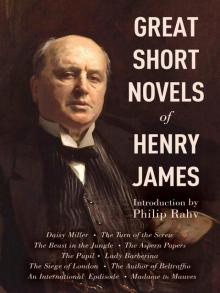 Great Short Novels of Henry James
Great Short Novels of Henry James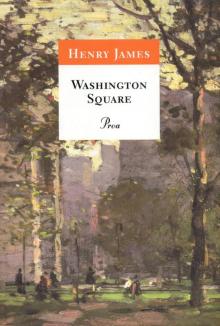 Washington Square
Washington Square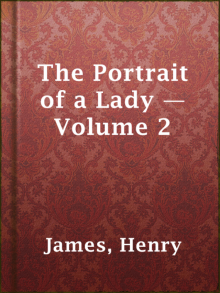 The Portrait of a Lady — Volume 2
The Portrait of a Lady — Volume 2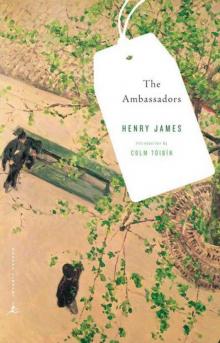 The Ambassadors
The Ambassadors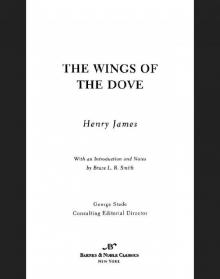 The Wings of the Dove
The Wings of the Dove The Princess Casamassima (Classics)
The Princess Casamassima (Classics) The Coxon Fund
The Coxon Fund First Frost
First Frost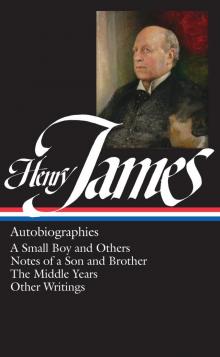 Henry James
Henry James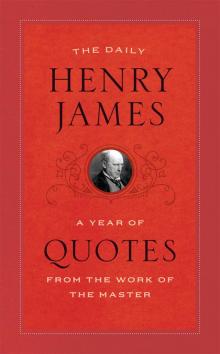 The Daily Henry James
The Daily Henry James Travels With Henry James
Travels With Henry James The Reverberator: A Novel
The Reverberator: A Novel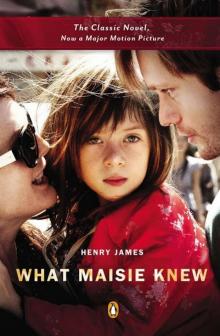 What Maisie Knew (Henry James Collection)
What Maisie Knew (Henry James Collection)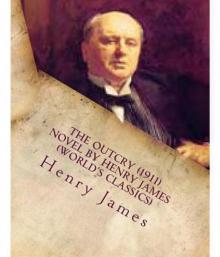 The Outcry
The Outcry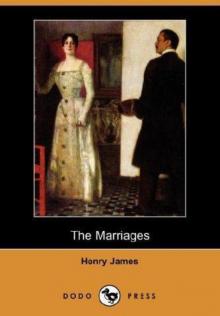 The Marriages
The Marriages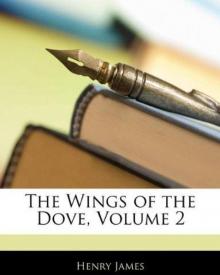 The Wings of the Dove, Volume 2
The Wings of the Dove, Volume 2 The Bostonians, Vol. I
The Bostonians, Vol. I The Outcry: -1911
The Outcry: -1911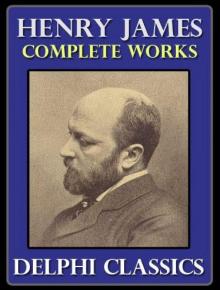 The Complete Works of Henry James
The Complete Works of Henry James Letters from the Palazzo Barbaro
Letters from the Palazzo Barbaro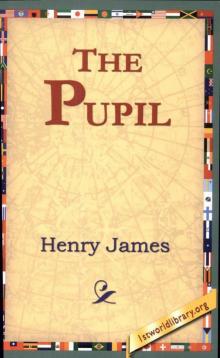 The Pupil
The Pupil The Bostonians, Vol. II
The Bostonians, Vol. II Pandora
Pandora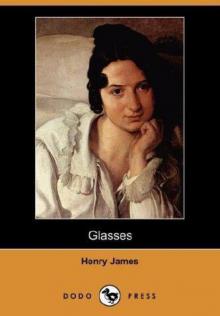 Glasses
Glasses The Princess Casamassima
The Princess Casamassima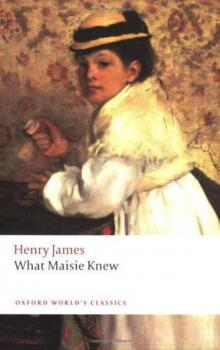 What Maisie Knew
What Maisie Knew The Reverberator
The Reverberator The Golden Bowl - Complete
The Golden Bowl - Complete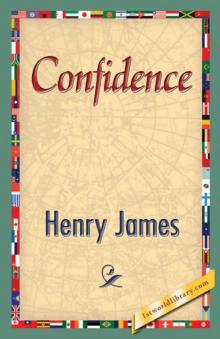 Confidence
Confidence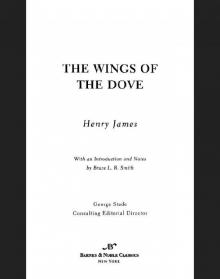 Wings of the Dove (Barnes & Noble Classics Series)
Wings of the Dove (Barnes & Noble Classics Series) The Spoils of Poynton
The Spoils of Poynton